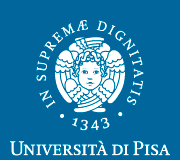
Contatti: ilaria.resci@phd.unipi.it
Supervisore tesi: Prof.ssa Barbara Turchi
Titolo Progetto: Ricerca, isolamento e caratterizzazione di batteriofagi litici vs Staphilococcus aureus, per il loro utilizzo come strategia alternativa agli antimicrobici nel trattamento di multi-drug resistance S. aureus
Abstract: Il fenomeno dell’antibiotico resistenza risulta essere ad oggi, uno dei problemi sanitari più importanti a livello globale. L’utilizzo incontrollato di questi farmaci nel passato, sia in medicina umana che in veterinaria, ha portato all’insorgenza di ceppi batterici multi-resistenti, ad oggi responsabili di più di 670 mila infezioni ogni anno, delle quali 33 mila fatali (Antimicrobial and resistance surveillance in Europe 2022; ECDC & WHO).Questa problematica ha riportato l’interesse verso la scoperta di strategie alternative e/o complementari agli antimicrobici, sia per preservare l’efficacia degli antimicrobici “last resort”, sia per poter trattare ceppi già ormai multi-resistenti. Nell’orda delle strategie alternative, l’utilizzo di batteriofagi rappresenta una strategia molto promettente. I batteriofagi (o fagi) sono virus specie-specifici dei procarioti, alle volte possono essere anche ceppo-specifici, incapaci di attaccare le cellule eucariotiche; questo aspetto li rende sicuri nei confronti sia dell’uomo che degli animali. Staphylococcus aureus è un batterio patogeno opportunista Gram-positivo, che si ritrova spesso nelle mucose (orale, nasale, e della cute principalmente) sia dell’uomo che negli animali. Nell’uomo è prevalentemente coinvolto in infezioni nosocomiali, ma può essere responsabile anche di setticemie, infezioni della cute e polmoniti. Negli animali, S. aureus è considerato principalmente un patogeno zoonotico, che può causare principalmente intossicazioni alimentari; si può ritrovare in tutte le specie animali (sia da compagnia che da reddito) ed anche nei loro prodotti (Es. latte e formaggio). Le infezioni di S. aureus in zootecnia si traducono solitamente in perdite economiche, di produttività e di benessere e la principale infezione causata da S. aureus è la mastite, seguita da piodermiti e talvolta sono possibili infezioni del tratto urinario. Tuttavia, ciò che rende S. aureus di particolare rilevanza, sono proprio le sue caratteristiche di multi-resistenza agli antimicrobici. Sulla base di queste premesse, lo scopo di questo progetto è quello di isolare batteriofagi attivi contro S. aureus da poter impiegare a diversi livelli nella filiera agro-zootenica per bio-controllo e/o per un loro possibile utilizzo in fagoterapia.
Project Title: Research, Isolation and Characterization of Lytic Bacteriophages Against Staphylococcus aureus for Their Use as an Alternative Strategy to Antimicrobials in the Treatment of Multi-Drug Resistant S. aureus
Abstract: Antibiotic resistance is currently one of the most critical global health issues. The uncontrolled use of these drugs in the past, both in human and veterinary medicine, has led to the emergence of multi-drug resistant bacterial strains, now responsible for over 670,000 infections each year, 33,000 of which are fatal (Antimicrobial and Resistance Surveillance in Europe 2022; ECDC & WHO). This issue has renewed interest in the discovery of alternative and/or complementary strategies to antimicrobials, both to preserve the efficacy of “last-resort” antibiotics and to treat already multi-resistant strains. Among these alternative strategies, the use of bacteriophages represents a highly promising approach. Bacteriophages (or phages) are viruses that are species-specific to prokaryotes, and sometimes even strain-specific. They are incapable of infecting eukaryotic cells, making them safe for both humans and animals. Staphylococcus aureus is a Gram-positive opportunistic pathogen commonly found on mucous membranes (oral, nasal, and skin) of both humans and animals. In humans, it is primarily associated with nosocomial infections but can also cause sepsis, skin infections, and pneumonia. In animals, S. aureus is considered mainly a zoonotic pathogen that can cause food poisoning. It can be found in all animal species (both companion and livestock animals) and in their products (e.g., milk and cheese). In livestock farming, S. aureus infections typically result in economic losses, decreased productivity, and compromised animal welfare. The most common infection caused by S. aureus is mastitis, followed by pyodermatitis and, in some cases, urinary tract infections. However, what makes S. aureus particularly significant is its pronounced multi-drug resistance. Based on these premises, the aim of this project is to isolate bacteriophages active against S. aureus, with the goal of applying them at various levels of the agri-food and livestock production chain for bio-control and/or their potential use in phage therapy.
Scopus: https://www.scopus.com/authid/detail.uri?authorId=58417801800
Comunicazioni orali a congresso
- Resci I., Turchi B., Salvucci S., Raffaelli M., Olivieri F., Marzoni M. (2024) – Preliminary evaluation of Lactobacillus spp. isolated from Italian native poultry breeds for use as probiotics: susceptibility to antimicrobials and pH resistance. 77° Convegno SISVET, Parma (Italia); 12-14 Giugno 2024
- Resci, I., Pedonese, F., Fratini, F., Torracca, B., Gelli, A., García, P., Turchi, B. “Isolation and characterization of S. aureus isolates and their prophage detection and induction”. 29th November 2024, Season Two – Games of Research, DSV-UNIPIsa Edition. Department of Veterinary Sciences, University of Pisa.Game of Research – Unipi Edition 2024.
